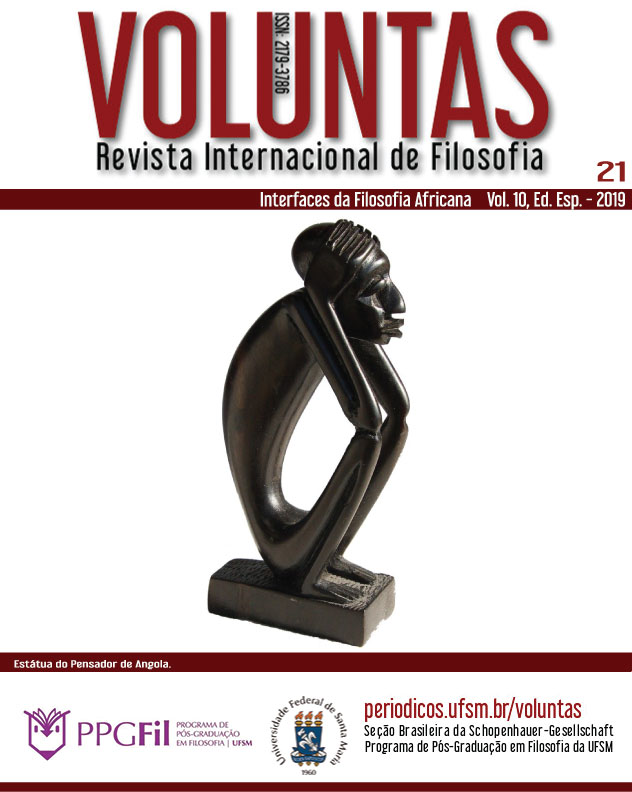“Solely who knows where Luanda is will know how to value”: oral tradition as ancestral heritage
DOI:
https://doi.org/10.5902/2179378639887Keywords:
Oral Tradition, Ancestral Knowledge, Educational PracticesAbstract
The objective of this paper was to reflect on the importance of the Oral Tradition as well as the possibilities of this being present in the Brazilian educational practices, provoked by the experiences of the stage realized in Escola Primária 16 de Junho, in Luanda, Angola, through the Program of Student Exchange. Based on bibliographical researches of authors who have dedicated their studies to the theme of the African oral tradition and its unfolding, we seek to perceive the African tradition not only as rich in historical aspects but as an instrument of cultural knowledge that permeates a society. The theoretical contributions brought forward aim to broaden our view of the legacy of predominantly oral cultures that are not emptied of teachings. Such considerations help us to realize that the various black cultural practices developed in our country embrace African practices and knowledge. Considered as a continent of the spoken word, Africa recognizes the word as an instrument for the preservation of ancestral knowledge. The word is sacred and composed of vital force. In education, the word, orality, is present, as in the oral tradition. Orality, an element of tradition, mediates social, political, economic and cultural relations. Thus, we conclude by thinking of an education that through the teachings of the African oral tradition contributes to a knowledge in which the being is involved in the totality.
The objective of this paper was to reflect on the importance of the Oral Tradition as well as the possibilities of this being present in the Brazilian educational practices, provoked by the experiences of the stage realized in Escola Primária 16 de Junho, in Luanda, Angola, through the Program of Student Exchange. Based on bibliographical researches of authors who have dedicated their studies to the theme of the African oral tradition and its unfolding, we seek to perceive the African tradition not only as rich in historical aspects but as an instrument of cultural knowledge that permeates a society. The theoretical contributions brought forward aim to broaden our view of the legacy of predominantly oral cultures that are not emptied of teachings. Such considerations help us to realize that the various black cultural practices developed in our country embrace African practices and knowledge. Considered as a continent of the spoken word, Africa recognizes the word as an instrument for the preservation of ancestral knowledge. The word is sacred and composed of vital force. In education, the word, orality, is present, as in the oral tradition. Orality, an element of tradition, mediates social, political, economic and cultural relations. Thus, we conclude by thinking of an education that through the teachings of the African oral tradition contributes to a knowledge in which the being is involved in the totality.
Downloads
References
BÂ, Amadou Hampâté. A tradição viva. In: ZERBO, Joseph Ki (org). História Geral da África I: Metodologia e pré-história da África. Brasília: UNESCO, 2010.
BÂ, Amadou Hampâté. Confrontações culturais: entrevista concedida a Philippe Decraene. THOT, nº 80, abr 2004, p. 03-12.
FÉLIX, João Batista de Jesus. Hip Hop: cultura e política no contexto paulistano. Curitiba: Apris, 2018.
LEITE, Ana Mafalda. Oralidades e Escritas nas Literaturas Africanas. Lisboa: Edições Colibri, 2014.
MUNANGA, Kabengele (org.). Superando o racismo na escola. Brasília: Ministério da Educação/Secretaria de Educação Continuada/Alfabetização e Diversidade, 2005.
NUNES, Cícera. A cultura de base africana e sua relação com a educação escolar. Revista Metáfora Educacional, nº 10, jun. 2011. p. 38-50. Disponível em: <http://www.valdeci.bio.br/revista.html>. Acesso em: 01 dez. 2016.
NUNES, Susana Dolores Machado. A milenar arte da oratura angolana e moçambicana: aspectos estruturais e receptividade dos alunos portugueses ao conto africano. Porto: Centro de Estudos Africanos da Universidade do Porto, 2009. E-book;
CEAUP Edições eletrônicas. Disponível em: <http://www.africanos.eu/ceaup/uploads/EB015.pdf>. Acesso em 01 set. 2016.
OLIVEIRA, Julvan Moreira de. Africanidades e educação: ancestralidade, identidade e oralidade no pensamento de Kabengele Munanga. Tese de Doutorado - Faculdade de Educação, Universidade de São Paulo, São Paulo, 2009. Disponível em: . Acesso em: 20 de novembro de 2016.
OLIVEIRA, Julvan Moreira de; NASCIMENTO, Sérgio Luis do. A Construção do Legado: a negação de uma epistemologia filosófica africana. Revista ABPN, vol. 8, nº 19. Mar-Jun 2016, p. 177-194. Disponível em: <http://www.abpnrevista.org.br/revista/index.php/revistaabpn1/article/view/31>. Acesso em: 11 de agosto de 2018.
PAULA Jr, Antônio Filogênio de. Educação e Oralidade na Cultura Negra no Brasil. Piracicaba: UNIMEP, 2013.
PAULA Jr, Antônio Filogênio de. Educação e oralidade no oeste africano pela representação de Amadou Hampâté Bâ. 2014. 158 p. Dissertação (Mestrado em Educação) – Faculdade de Ciências Humanas, Universidade Metodista de Piracicaba: SP,
RIBAS, Oscar. Temas da vida angolana e suas incidências. Luanda: Edições Chá de Caxinde, 2002.
ROCHA, Rosa Margarida de Carvalho. A Pedagogia da Tradição: as dimensões do ensinar e do aprender no cotidiano das comunidades afro-brasileiras. Revista Paidéia, ano 8, nº 11, jul-dez 2011, p. 31-52.
SILVA, Acildo Leite da. Memória, tradição Oral e a afirmação da identidade étnica. GT: Afro-brasileiros e educação. 27ª Reunião da ANPED, 2006. Disponível em: <http://27reuniao.anped.org.br/gt21/t211.pdf>. Acesso em: 11 de agosto de 2016.
Published
How to Cite
Issue
Section
License
The submission of original manuscripts to this journal implies the transference, by the authors, of the copyrights for printed and digital publication. The copyrights of a published manuscript belong ultimately to the author, and only the copyright for its first publication is reserved to the journal. Authors may only use the same results in other publications explicitly indicating this journal as the medium of the original publication.
Licence
Attribution-NonCommercial-ShareAlike 4.0 International (CC BY-NC-SA 4.0) - This license lets others remix, tweak, and build upon your work non-commercially, as long as they credit you and license their new creations under the identical terms.






